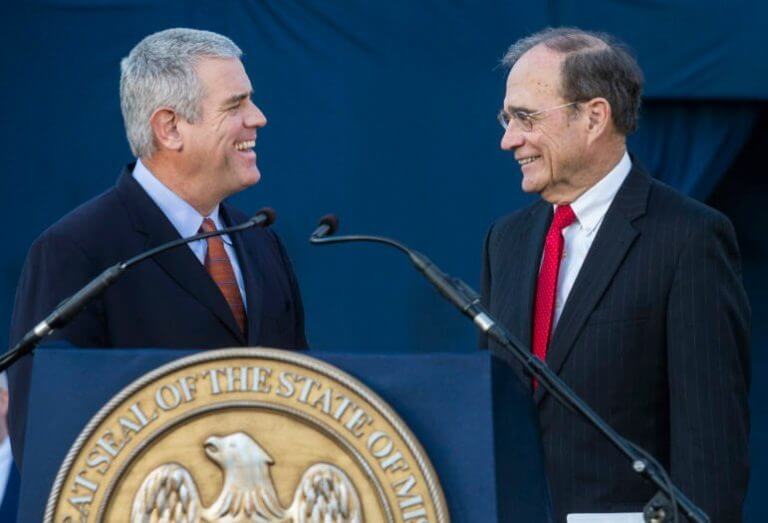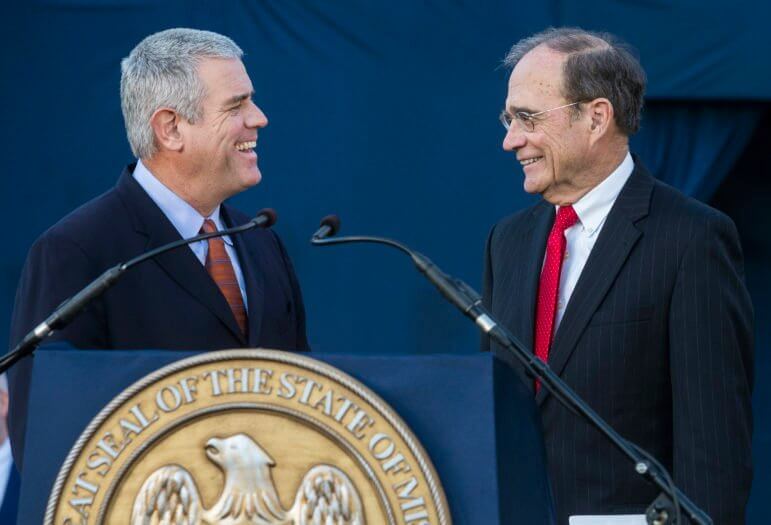

Eric J. Shelton/Mississippi Today, Report For America
House Speaker Philip Gunn, left, and Lt. Gov. Delbert Hosemann share a laugh before the State of the State Address at the State Capitol Monday, January 27, 2020.
Lt. Gov. Delbert Hosemann and Speaker of the House Philip Gunn once supported allowing all Mississippians to vote early in person. So why, as many Mississippians fear for their safety during the COVID-19 pandemic, did the Legislature’s two presiding officers retreat from that position?
Various studies show that Mississippi did less than the vast majority of other states to make voting safer ahead of the Nov. 3 general election. The Brookings Institute, which has tracked states’ actions on voting during the pandemic, gave Mississippi a D ranking for its 2020 efforts. Other groups that track voting issues gave Mississippi similar or worse grades.
It became obvious early on that the Republican leadership in Mississippi was not going to expand mail-in voting options as most other states had done. But history indicated that there was an appetite among key politicians for allowing all Mississippians to vote early in person.
In both the 2016 and 2017 sessions, the Mississippi House of Representatives voted by overwhelming margins to allow all Mississippians to vote early at their circuit clerks’ offices. The measure passed 117-2 in 2016, and 113-8 in 2017. Gunn voted in favor of both early voting bills.
In both years, the early voting measures were killed in the Senate, where Tate Reeves presided as lieutenant governor. But in 2020, there was a new sheriff in town as lieutenant governor: Delbert Hosemann, who had also advocated for in-person early voting for all Mississippians while serving as secretary of state and the state’s chief elections officer.
It seemed like a no-brainer that in-person early voting could pass at least for 2020 to try to make elections safer for those concerned about the coronavirus. But such was not the case, and the “why” is not clear.
Granted, Reeves is now serving as governor and presumably could have vetoed any early voting effort. But in 2016 and 2017, early voting passed the House by margins far greater than the two-thirds majority needed to override a governor’s veto. With Hosemann’s backing, perhaps it would have passed the Senate by similar margins. Perhaps Reeves would have signed the bill. We will never know.
During the 2020 session, Hosemann barely said a word in support of early voting. When asked recently after what was described by legislative leaders as the longest session in history if more should have been done to help make the election process safer, Hosemann said, “I think they (legislators) did a good job.”
Existing state law allows those who are going to be away from their homes on Election Day, those over the age of 65 and the disabled to vote early. In the 2020 session, as Hosemann pointed out, the Legislature added a new provision to the state elections law to allow those in a physician-imposed quarantine because of the coronavirus and those who are caretakers for people impacted by the coronavirus to vote early.
But those who might want to vote early to minimize the risk of catching COVID-19 in potentially crowded precincts will be out of luck. And, by the way, current Secretary of State Michael Watson has said the wearing of masks will not be mandated in those precincts.
In the two years that the House passed early voting, Bill Denny, R-Jackson, served as Elections Committee chair. He was defeated in his 2019 re-election bid and was replaced as House Elections chair by Jim Beckett, R-Bruce. Beckett said recently he did not necessarily oppose early in-person voting, but consensus to pass such a proposal could not be reached during the 2020 session. He said support was needed not only from legislators, but from county circuit clerks, election commissioners, the secretary of state and others.
While it might be a mystery why legislative leaders were not willing to approve early voting, the process of developing the elections bill that ultimately passed was done in a secretive fashion. Legislative rules mandate that the conference committees — where House and Senate leaders meet to hash out the final version of a bill — be conducted in open, public session. But that rule is almost always ignored, and during the coronavirus pandemic, there were even fewer in-person meetings occurring at the Capitol.
When asked whether in-person early voting was being considered, Senate Elections Chair Jenifer Branning, R-Philadelphia, said she would comment when a compromise was reached.
Such a lack of transparency only adds to the mystery of why legislative leaders, who had supported early voting in the past, refused to consider it in a year when Mississippians might need it most.
The post Hosemann and Gunn once supported early voting. Why did they retreat during COVID-19? appeared first on Mississippi Today.
- UMMC clinic closures extend to Friday amid cyberattack recovery - February 25, 2026
- Regency Hospital in Meridian to close by mid-March - February 25, 2026
- Advocates call for funding, collaboration as more Mississippians are expected to struggle with food insecurity - February 25, 2026